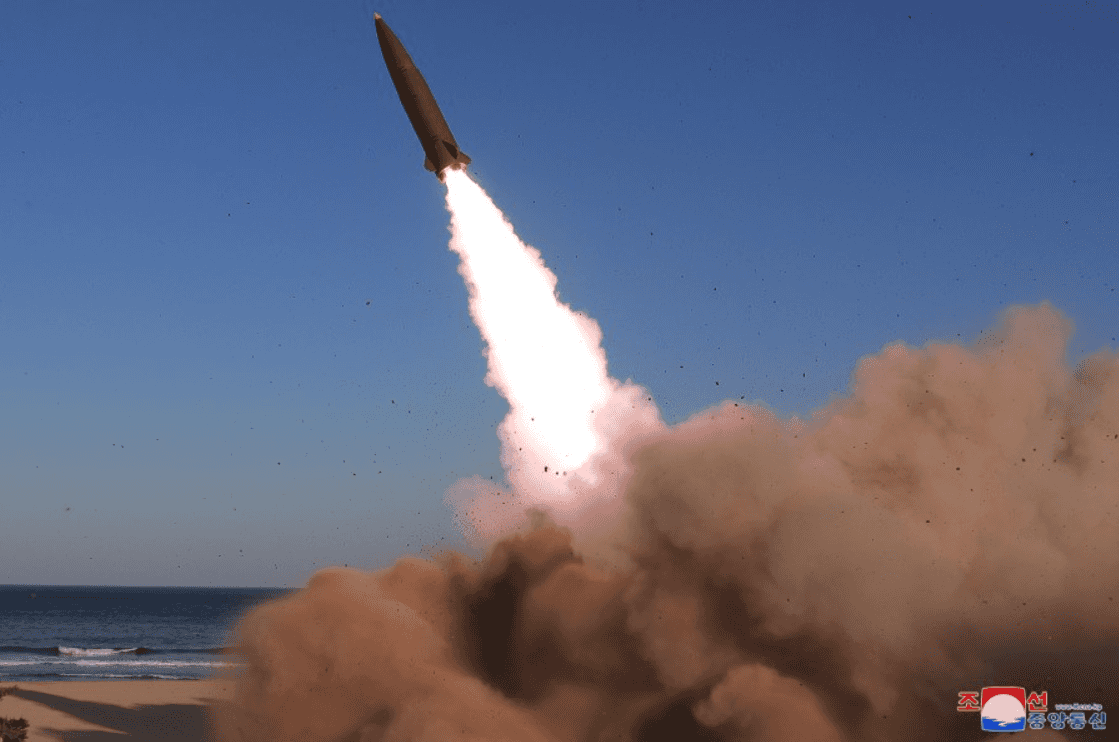
This article was originally published by Radio Free Asia and is reprinted with permission.
North Korea fired a suspected mid-range ballistic missile over the sea off its east coast on Monday, said South Korea’s military, two weeks before U.S. President-elect Donald Trump takes office.
The launch came as U.S. Secretary of State Antony Blinken was in the South Korean capital for talks with the acting president in the midst of weeks of political turmoil there.
The South’s Joint Chiefs of Staff, or JCS, said the military had detected the launch, which originated in the Pyongyang area at around noon, and it flew around 1,100 kilometers (684 miles) before landing in the sea less than 10 minutes later.
The JCS called the launch a “clear provocation” and said it was monitoring the situation and that it shared relevant information with the United States and Japan.
Japan’s Ministry of Defense also confirmed the launch and said it was thought the missile had already fallen into the sea.
Addressing North Korea’s development of missiles and nuclear weapons in violation of U.N. resolutions, and its hostility towards the United States and its allies including South Korea, is a top priority for all U.S. administrations.
Blinken, in his talks in Seoul with Acting President Choi Sang-mok, stressed an “unwavering” U.S. security commitment to South Korea and said their alliance remained “more essential than ever.”
Trump, who will take office on Jan. 20, spearheaded an unprecedented diplomatic push on North Korea during his first term as president, meeting leader Kim Jong Un three times but making no progress on efforts to get him to abandon his nuclear and missile programs.
Trump raised his engagement with North Korea during his election campaign and in a sign that he might have an eye on reviving the effort, he has picked an aide who was involved in planning the summits with Kim.
William Beau Harrison will be an assistant to the president and deputy chief of staff for operations, the Trump transition team said Saturday, noting Harrison’s “critical” role in planning the meetings with Kim.
“During President Trump’s first term, Mr. Harrison served as the liaison between the operational elements of the Executive Office of the President and was charged with the coordination and execution of all presidential travel, including dozens of complex international visits,” the team said.
“He has participated in and led multiple U.S. delegations across the globe in countries such as North Korea, Iraq and Afghanistan and played a critical role in planning each of the historic summits with DPRK leader Kim Jong Un,” the team added. DPRK, or the Democratic People’s Republic of Korea, is the North’s official name.
More talks?
Trump first met Kim in June 2018 in Singapore, then in Hanoi in February 2019, then at the Demilitarized Zone between North and South Korea in June 2019, where Trump became the first U.S. president to set foot on North Korean territory.
Trump sought to curb North Korea’s nuclear program, while Kim aimed to ease sanctions and gain international prestige but the effort brought no progress on denuclearization or any lasting improvement in relations.
Last month, Trump named a former ambassador to Germany, Richard Grenell, as his presidential envoy for special missions that he said covered “some of the hottest spots” around the world, including North Korea.
Trump has also named Alex Wong, who was engaged in working-level nuclear talks with Pyongyang during his first term, as his principal deputy national security adviser.
During the election campaign Trump defended his relationship with North Korea saying that “getting along” with Kim was a “good thing,” and suggested North Korea would not be “acting up” if he returned to the White House.
Former Trump adviser Robert O’Brien told media in September that Trump might resume talks with North Korea if re-elected but questioned whether Kim would commit to denuclearization.
But Kim had appeared to rule out the prospect of improving relations with the U.S. under incoming Trump, saying negotiations with the U.S. in the past had only confirmed its unwavering hostility.
Kim did not refer to Trump by name but said that given U.S. policy towards North Korea, its only option was to achieve the “most powerful military capabilities,” North Korean state media reported in November.
TK
Source: American Military News Rephrased By: Trump Knows